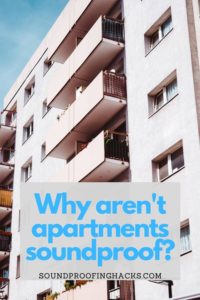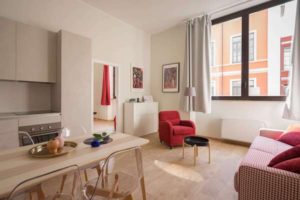Why aren’t Apartments Soundproofed? You might be surprised
When my family moved into an apartment, one of the first things we noticed was the lack of soundproofing. We were a bit surprised that this aspect of our home was not exactly well taken care of, considering that the developer was well known in the market for its high quality work.

I poked around and asked a few of my friends, and they came back with similar findings, prompting me to ask the question: Why aren’t apartments soundproof?
Or could this be an isolated issue? It didn’t seem that way, but it was pretty difficult to find the direct answers from a developer, so I turned to forums and developer websites to find out more.
The article today is just my personal opinion and not meant to represent any developer or construction companies.
Recommended: Make your van soundproofing seem like child’s play! 3 easy methods to choose from
Contents: Skip to section
Overview
Regulations related to acoustics in residential buildings in America, as well as several other countries, follow the International Building Code, and a cursory search for the organisation plus soundproofing turned up very little useful information, only a small mention of Sound Transmission Class (STC).

That probably means that soundproofing is not exactly on the top of the checklist for developers,.
Secondly, while you can soundproof your own apartment on a budget or even with household items, the same cannot be said when it comes actual construction by a professional.
To soundproof an apartment requires specific materials, which will obviously drive the costs up. If that is the case, there is not much impetus for the developer to ensure this is being done for the project, especially if there is no regulation behind it.
And thirdly, similar to the cost, you need a certain expertise in the acoustics field to be in your team. This particular expert can be difficult to engage and in the same vein, expensive to hire.
All these 3 factors are probably the main reason why apartments are not soundproofed. Lets take a deeper look into the factors below.
Recommended: 6 Best Quiet Pellet Guns 2020
Cost
A simple, small apartment building can easily cost upwards of a hundred thousand dollars in construction. Most apartments are tall buildings, or include multiple buildings. So, multiply that cost for each unit in the complex and that becomes astronomical.
Every dollar that a developer sinks into a single apartment unit will need to be replicated for every single unit. The cost of soundproofing is high and if you include it into each and every unit during construction, it can easily cost an extra $10-15,000 for each room.
Imagine apartment complex that has 30 rooms (which is a relatively small apartment building). That’s an extra $300-450,000 in costs for specialized materials alone for something that may not have much of an impact on rent.

Also keep in mind, a building with only 30 rooms is very small. Investors are not going to want to spend half a million on soundproofing, and if a building or complex has 100 rooms, you can see how quickly the costs explode.
Keep in mind that when you soundproof a room, it is not just a matter of adding insulation in the walls. The materials that are used in the building have to be rethought because a lot of the sound that travels between apartments travels through the structure of the building.
Soundproofing involves insulating the walls. Building the structure so that sound can not travel easily from room to room and unit to unit.
Next, you need to soundproof the doors and windows, which means heavy duty or solid wood doors and window frames, all pretty expensive to procure.
For flooring, it requires thinking about the padding under the flooring and the materials above each ceiling. This means additional expertise in the architects, construction manager, and general labor.
Then there is the general cost of maintenance. If I design and build a house and sell it, then I am no longer responsible for it. However, if I run an apartment complex, I have to maintain it. The cost of a soundproof window is double or even triple the cost of a regular window, which means I need to charge higher rent in case several windows need replaced each year.
Hey, quick one. If you intend to start a soundproofing project soon, check out our Best Materials for Soundproofing post to get a headstart. Most projects require similar materials, so this post will save you a ton of time researching.
Recommended: 5 Best Quiet Pickleball Paddles 2020
Complicated
To construct a soundproof wall, you need to use a method known as decoupling. Normally in a wall, the wall stud inside touches both sides of the drywall.
Sound is transmitted through the stud from one side to the other whether it is ambient noise (a TV) or impact noise (knocking on the wall). If you decouple the wall, you alternate the side of the wall the framing touches, it does not touch both. This requires the extra work and expertise.

However, decoupling addresses only one part of noise levels. Decoupling suppresses higher frequencies (conversations etc.), but actually makes the wall worse at blocking lower frequencies (deeper sounds such as a television and music). This means that you then need extra layers of drywall or extra insulation or materials in the wall.
Structural issues aside, consider all the different ways the sound can get into your apartment: under your door, through the gaps in the canned lights in the ceiling, HVAC ventilation. Each of those must be addressed to ensure that all of the structural changes will still matter.
Recommended: How to soundproof wooden floors using 3 simple methods
Related issues
Soundproofing does not exist in a vacuum. (Ha!) It has side effects.
Take the decoupled wall above. Without the studs touching both walls, it will be much harder for tenants to hang pictures and televisions on the walls.
The walls are potentially more susceptible to cracks and structure damage. If there is a water leak and the drywall is extra thick or if the insulation is expensive, then the maintenance costs climb very quickly.
One of the best ways to insulate a room’s floors and ceiling is through the use of extra concrete. Increasing the height of the building increases the cost exponentially.
Adding a foot of concrete between every floor means adding extra height, and adding to initial costs. Or it means keeping the same height, but making the apartments’ ceilings lower. Most people prefer slightly high ceilings.
Recommended: How to soundproof air vents: 3 Easy methods that work
Features VS Cost of Rent
When an apartment is designed, the investors only want to pay for things that will attract renters and increase rent. The costs and features of an apartment are a series of trade-offs.
- Do you want a nice location, or soundproof doors?
- Do you want big bright bay windows, or ones that are soundproof?
- Do you want expensive soundproofing between walls and floors, or a high-end fire-prevention system?
The things that people will pay more for in rent are generally not soundproofing, and therefore soundproofing is not a high priority.
Recommended: Top 5 Best Quiet Hair Clippers for Toddlers
Conclusion
While it might be difficult to find an apartment that has soundproofing features built in, it does not mean we cannot take action.
Soundproofing Hacks was founded for this exact reason, to reclaim peace for your family and yourself.
So do browse around and your will find lots of useful articles that helps you with DIY soundproofing projects as well as buying guides to select the best quiet products.
If you have a comment to share, please leave a note in the section down below!
Additional reading:
- How to stop wind from blowing down chimney: 3 simple steps you can follow right now
- How to soundproof a garage door from the inside? 3 easy ways to get started
- How to quiet a pool pump: 3 easy steps to start today!
- How to soundproof a room for drums: Turn it into a reality now!
- How to Soundproof Barn Doors in 9 Practical Ways
- 9 Best Acoustic Partitions: How to choose the right one
- 5 Best Quiet Drones 2020: Reviews and Guide
- 6 Best Quiet Coffee Grinders (Updated 2020)
- Top 5 Best Quiet Hair Clippers for Toddlers
